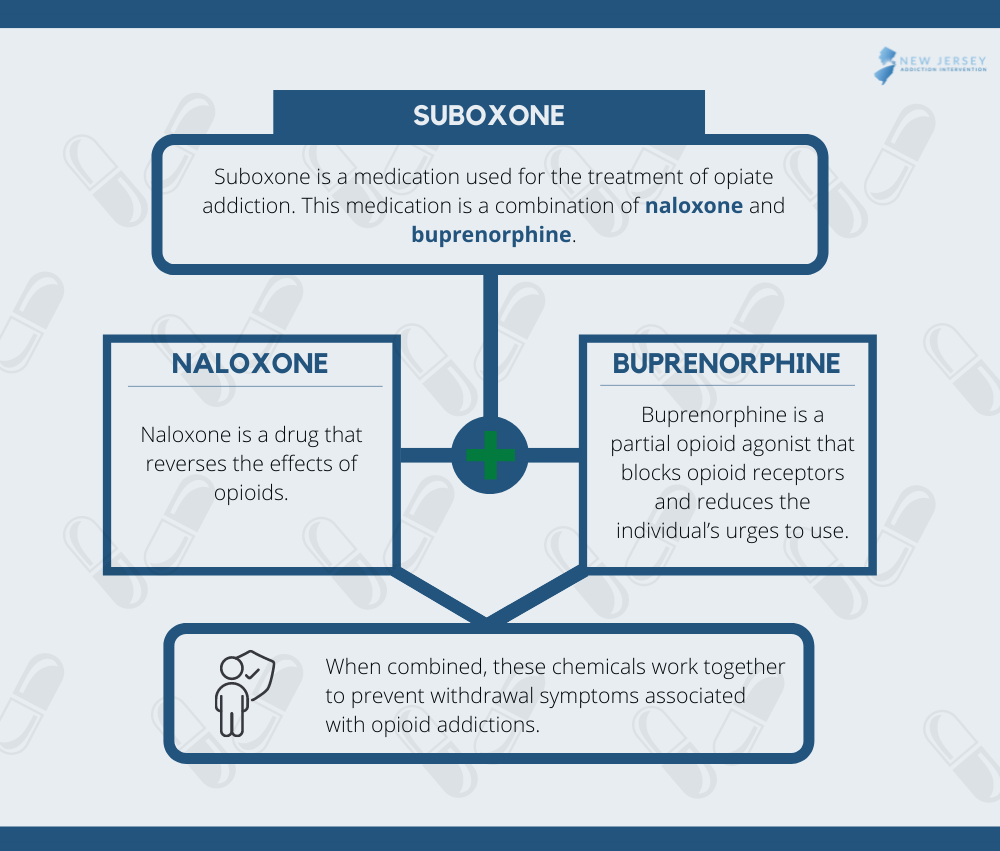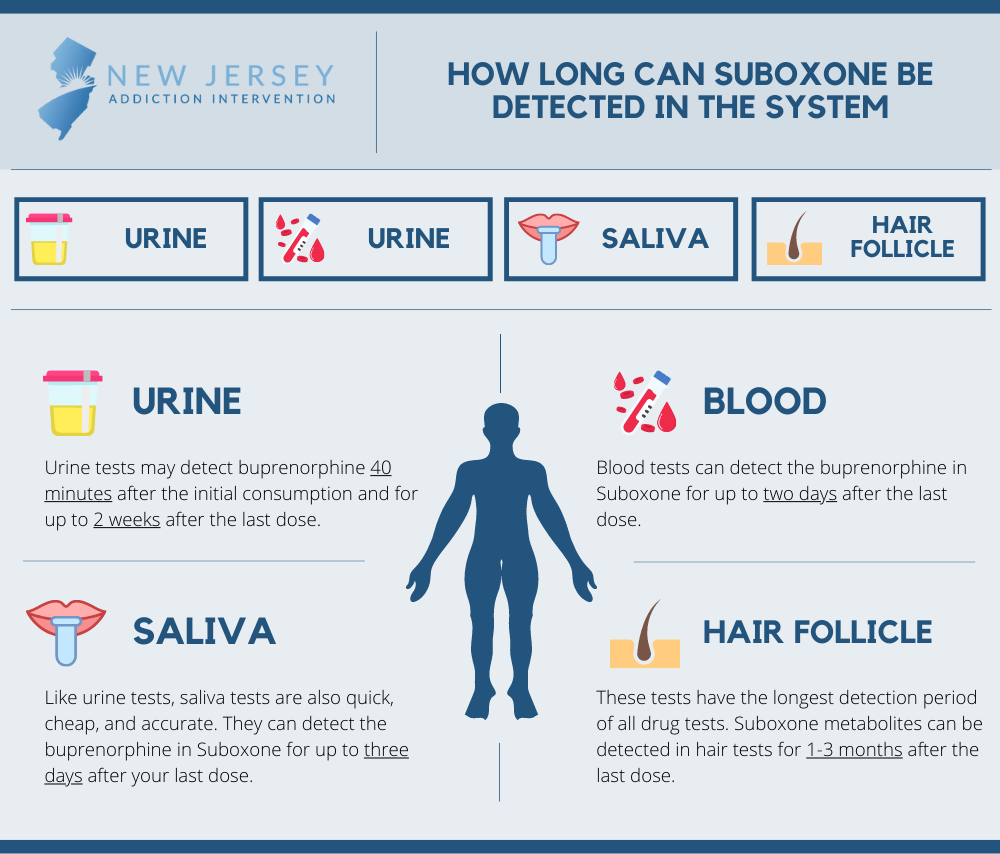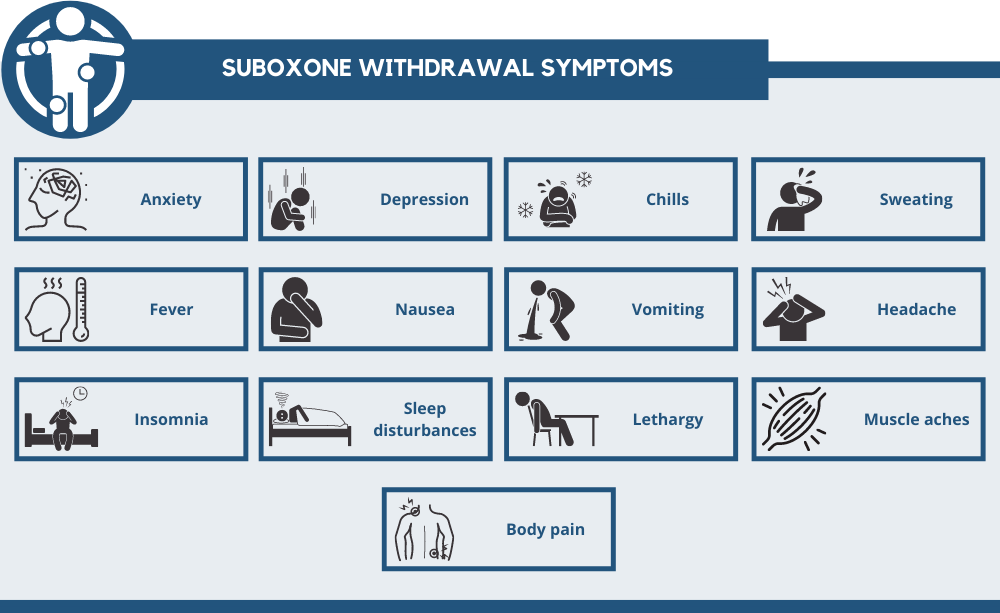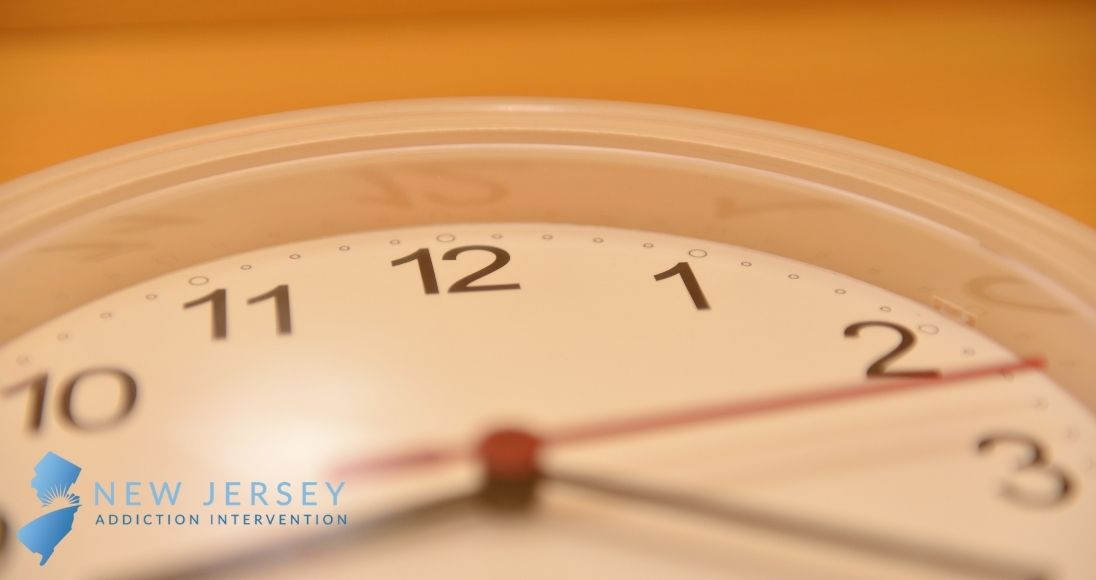Suboxone is a prescription medication containing buprenorphine and naloxone. It is a semisynthetic partial opioid drug that is used to treat opioid use disorder. Although it was originally developed as a safer, less addictive alternative to methadone, some people abuse Suboxone by taking it without a prescription or taking a higher dose than prescribed.
Buprenorphine, the opioid medication in Suboxone, doesn’t create the same euphoric high as other opioid drugs do. Instead, it can successfully reduce or even eliminate opioid withdrawal symptoms and cravings. However, as an opioid, buprenorphine can be addictive. If you take buprenorphine for an extended period of time your system may become physically dependent on it. This means you may have withdrawal symptoms if you abruptly stop using Suboxone.[1]
How long Suboxone stays in your system can impact when your withdrawal symptoms start and how long they will last. It can also influence how long the substance will show up on different types of drug tests. In general, the effects of one dose of Suboxone last for 24 hours, and the drug is eliminated from your system after 5 to 8 days. This timeline can vary from one person to the next because there are many individual factors that dictate how long it takes Suboxone to leave your system.

How Does Your Body Metabolize Suboxone?
Buprenorphine has a longer elimination half-life than most other opioids do. Half-life refers to how long it takes for half of a dose of a substance to leave your body. In the case of buprenorphine in Suboxone, the half-life is 24 to 42 hours. Naloxone, on the other hand, has a shorter half-life of 2-12 hours, so it leaves the body at a faster rate.[2] Since it takes four to five half-lives to eliminate a substance from the body, it can take 5-8 days for Suboxone to leave your system.
Even though the drug will be out of your system after about a week, it can be detected in the body for much longer. This is because drug tests screen for metabolites which are traces or byproducts of substances that remain in your body after a substance is metabolized.
The liver is responsible for metabolizing Suboxone. The liver metabolizes buprenorphine and naloxone into metabolites which can be detected on a drug test. Buprenorphine has a longer half-life than naloxone, so most people are more concerned with how long buprenorphine metabolites can be detected in their system.
After being metabolized by the liver, buprenorphine is eliminated in the urine and feces, and naloxone is excreted through urine.[1]
Variables That Affect How Long Suboxone Stays in Your System
The amount of time it takes Suboxone to leave your system varies from one person to the next due to a variety of individual factors. For example, people with moderate-to-severe liver disease can take nearly twice as long to metabolize and eliminate Suboxone.[3] Other factors include:
- Height and weight
- Percent body fat content
- Age
- Metabolism
- Duration and frequency of Suboxone use
- Size of the last dose
- Liver and kidney health
- Combining Suboxone with other drugs or medications
How Long Can Suboxone Be Detected in My System?

Various types of drug tests can be used to test for Suboxone or buprenorphine. The type of test used will affect the length of time that the drug is detected. Here are estimates of how long Suboxone will be detected in urine, blood, saliva, and hair follicle tests:
Urine
Urine tests, also known as urinalysis, are the most commonly used type of drug test. They are affordable, non-invasive, and accurate. Urine tests may detect buprenorphine 40 minutes after the initial consumption and for up to 2 weeks after the last dose.
Blood
Blood tests aren’t used very often due to their short testing window and invasive nature. They are most commonly used in hospital settings. Blood tests can detect the buprenorphine in Suboxone for up to two days after the last dose.
Saliva
Like urine tests, saliva tests are also quick, cheap, and accurate. They can detect the buprenorphine in Suboxone for up to three days after your last dose.
Hair Follicle
Buprenorphine and naloxone metabolites can build up in the hair follicle and be detected in hair follicle tests. These tests have the longest detection period of all drug tests. Suboxone metabolites can be detected in hair tests for 1-3 months after the last dose.
Suboxone Withdrawal Symptoms and Timeline
If you abruptly stop using Suboxone, you may go into opioid withdrawal. Doctors usually recommend a Suboxone taper that slowly allows your system to adjust to lower and lower doses of buprenorphine. Tapering can reduce the severity of withdrawal symptoms as well as the risk of relapse.
Symptoms of Suboxone withdrawal are similar to those of opioid withdrawal, but they are usually not as intense. These include:[4]

- Anxiety
- Depression
- Chills
- Sweating
- Fever
- Nausea
- Vomiting
- Headache
- Insomnia
- Sleep disturbances
- Lethargy
- Muscle aches
- Body pain
Since Suboxone has a fairly long half-life, symptoms may not begin for 72 hours. Over the course of one-week symptoms will peak, then begin to subside after 7 days. Some post-acute symptoms can linger for a month or more but can usually be managed with lifestyle changes.
Find Help for Suboxone Abuse and Addiction
Suboxone is a highly effective medication when it is used correctly. When taken as prescribed as part of a medication-assisted treatment (MAT) program, it does not produce intoxicating effects and is not likely to lead to abuse. However, like all opioid drugs, there is a risk for abuse and addiction if the medication is misused.
Suboxone addiction isn’t as widespread as opioid addiction, but it is possible. Fortunately, there are many licensed and accredited rehab facilities in New Jersey that treat this kind of addiction. If you or a loved one are addicted to Suboxone, please give us a call today. We can evaluate your needs, verify your insurance, and help you choose the right addiction treatment program for you.
References:
Medically Reviewed: November 18, 2021

All of the information on this page has been reviewed and verified by a certified addiction professional.

